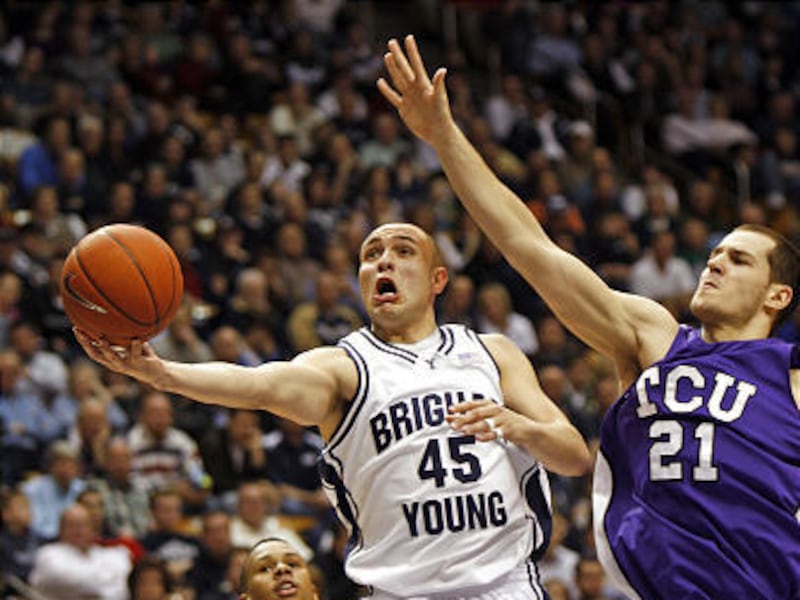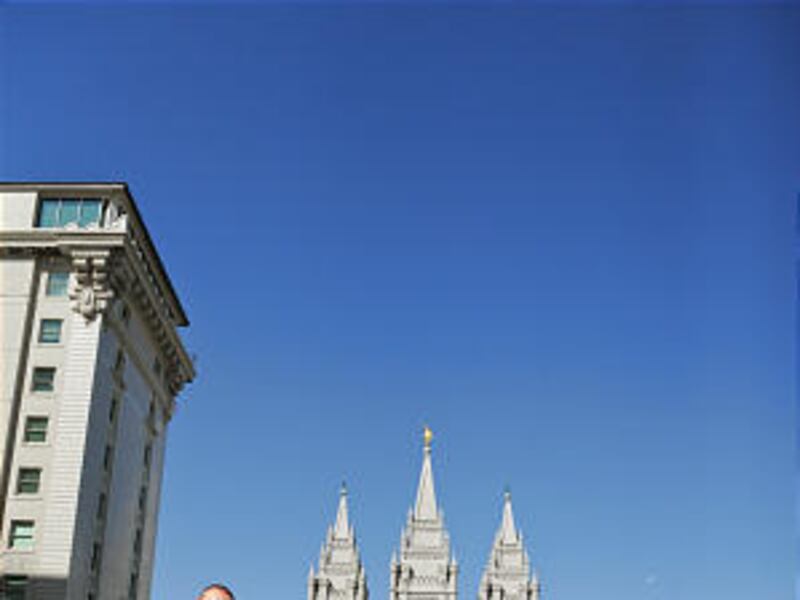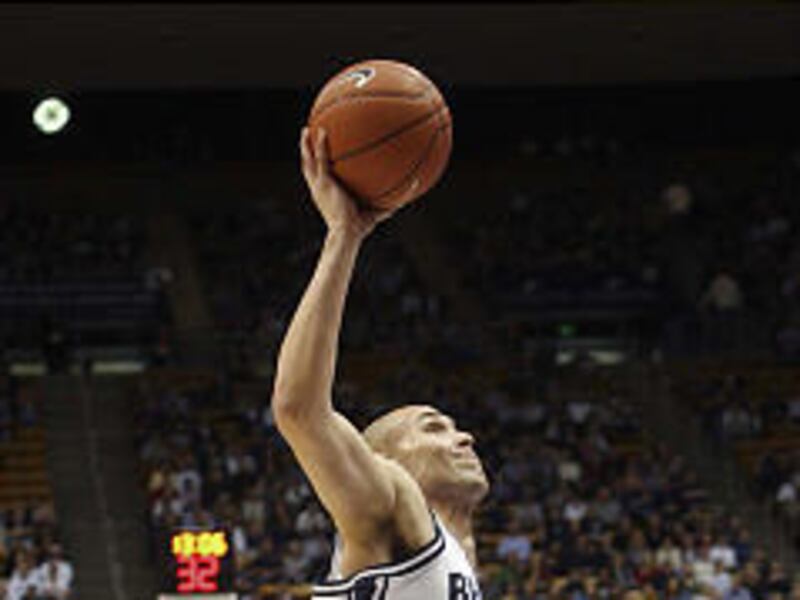Jonathan Tavernari, a native of Brazil with Italian blood on his father's side, learned early in life that to walk by faith is to follow a golden compass that never fails.
Tavernari, a BYU basketball player, was a former Catholic altar boy, and his parents remain committed Catholics. He converted to the Mormon faith after he left his native country as a 16-year-old to attend Timpview High School in Provo and pursue a dream to play basketball.
This is a venture that has taken him halfway around the world to a place where he barely understood the language. Now, at age 22, Tavernari is finishing his senior year at BYU
as the most prolific 3-point shooter in school history. He attends the temple every Friday with his wife, Kiri, whom he has established as his hero.
"I married a Molly Mormon," Tavernari said with a big smile. "She is the exact stereotype of what you'd describe in a Mormon girl. She is the light of my life and the best thing that ever happened to me. She is the rock that I lean on to lift me up when times are hard." The couple met in the fall of 2008 when they had a class in the same building on BYU's campus.
Tavernari's parents, Roberto and Thelma, sent their son to America to live with a friend, Brazilian native Walter Roese, in Provo. His mother had been his basketball coach since he took up the game, and the plan was for Roese, a professional coach in the U.S., to give him a home base to get his education and help him play basketball.
The Roese family, who are members of The Church of Jesus Christ of Latter-day Saints, enrolled Tavernari at Timpview High in Provo, a school with a solid hoops reputation. It wasn't long before Roese asked Tavernari if he wanted to attend church.
"I was just staying at home on Sundays. I said, 'Why not,' and I went with him," Tavernari said. "I saw a lot of people at church, a lot of kids that went to Timpview. It was a good place to be. I was good friends with the bishop's son, Andy Cusic, who was also on the basketball team, and he gave me rides to school."
At first, Tavernari felt awkward.
Tavernari's church attire comprised of a polo shirt and jeans. "Everybody else was wearing white shirts, ties and suits. And, boy, three hours is a long time."
But gradually, he fit right in. "The more I went, the more welcome I felt. It wasn't so much a knowledge thing, because I found much of what was discussed in the LDS Church were things my parents tried to teach me, and I said to myself, 'So, this is what they were trying to say.'"
Tavernari describes his mother as a "huge religious person" who attends Mass three times a week and made sure he experienced catechism, the process of instruction of Catholic doctrine. In Brazil, his parents enrolled him in basketball camps conducted by the Christian group Athletes in Action.
"I was taught if I ever had problems, to take them to Heavenly Father."
In October of his first year at Timpview when he was 16, his priesthood quorum buddies got together and gave him a set of scriptures. "I began to take active part in lessons and even bore my testimony.
"It was tough for me to be away from home, going to a school, speaking a different language and missing my parents for the first time. It was challenging, and faith got me through it. I read the Book of Mormon; I had read the Bible many times. When I got to Moroni's promise, it was my favorite scripture, that and Luke 1:37, For with God, nothing is impossible."
Tavernari accepted Moroni's challenge. "I knelt down and prayed and asked Heavenly Father if this book was true. I didn't get an answer if the things I was reading were true. What I did get is a feeling that Joseph Smith was a prophet of God, and I didn't even ask about that.
"I just knew that in my heart. I then started reading a lot of church books, including "The Work and the Glory" series. I really liked reading about church history, and I studied it and the life of Joseph Smith. I immediately came to know that he was a true prophet and his works were from God, and I had a burning in my heart that told me so and that my Savior Jesus Christ atoned for my sins. Those who know it know what I'm talking about."
Tavernari met with Bishop Mark Cusic and told him he was ready for baptism.
"After much fasting and prayer, I decided I needed to tell my parents in Brazil and get their permission."
Tavernari returned to Brazil that summer, where he had full support of his parents, who were impressed with his faith and the principles he'd embraced in living a Christlike life. He met with the missionaries and began the discussions in his home town of Sao Bernardo, Brazil.
"I sat down with them, and they pulled out a paperback Book of Mormon and handed it to me. I pulled out my set of scriptures and told them, 'Wait, I've got mine.' They were kind of astonished." He bore his testimony to the missionaries and was soon baptized.
Tavernari then moved to Las Vegas to play basketball at that city's famed Bishop Gorman High School, a powerhouse school that dominates in football and basketball. His foster parents were Steve and Teresa Westmoreland. He attended seminary at 5:15 every morning and earned his Duty to God Award.
"I loved seminary, but it was hard to get up that early. At Bishop Gorman, we were hated by everybody because our teams were so good. I had to go through a court case to be able to play because people in Las Vegas filed complaints about the school getting all these players."
At seminary, he met students from nearby Bonanza High, where most of the LDS kids attend. Bishop Gorman lost to Bonanza the first time they played, but when Tavernari was eligible, his team whipped Bonanza by 10.
"Some church kids told me Bishop Gorman stunk and we were terrible. People at church weren't very nice to me. I told them I was a new convert to the church. I was a counselor in my priesthood quorum. It was tough.
"My home teaching companion, John Barnes, and my bishop, Nick Lordes, were fantastic. They put their arms around me and told me not to listen to those kids, they were just mad. I felt the Lord touched my life, that even if you are in a place where you are not surrounded by Latter-day Saints, you have a chance to shine among everybody. Even in Happy Valley, you have a chance to make a difference."
Even before accepting a scholarship to play at BYU, Tavernari was attracted to service projects. He's always been eager to help and is a frequent speaker at firesides and other church meetings.
"I want to give back because I've been so blessed. This is a school that gave me my education and the place I found my sweetheart. Serving has changed my personality, from a boy away from home to a man. Being a member of the church has kept me in line, kept me in spiritual shape and helped me make good decisions.
"I've always felt the gospel had my back, saw it as a way to improve myself and do away with mind tricks. Seasons where things haven't gone well personally or athletically, I've gone to the Lord.
"My wife has played a big part of it, keeping my feet grounded, helping me to find balance in life. We go to the temple every week and do work for my ancestors."
Tavernari, who earned freshman of the year honors in the Mountain West, entered his senior year expecting much personal glory. He'd just finished two summers on the Brazilian national team as one of the top dozen players in his country.
But this year changed his journey, which he still hopes will lead to becoming a professional basketball player.
"I felt the team should adapt to me because I was a senior and I've experienced championships, but what really happened is I had to adapt myself to the team."
After shooting 1 for 11 from the field in an early BYU loss this year at Utah State, Tavernari went to BYU coach Dave Rose and told him he wanted to relinquish his starting spot, give it to sophomore Noah Hartsock, that he'd like to come off the bench as a strong sixth man.
"When it came down to it, this wasn't about me, it's about how can I help others around me. It was the right thing to do, but it was the most humbling thing I've ever done in my life. Individual success and glory might take me to the gates of heaven, but what will make me able to live there is understanding that it isn't reaching the goals but the journey."
Tavernari says Joseph Smith endured far more trials, was hounded, punished, beaten and killed. "People said he was crazy, but remembering him became an emotional experience for me, to see what he stood up against and what he suffered. Imagine how that compares with me being upset I wasn't scoring 20 points or playing 38 minutes a game. It is nothing to what he lived through and sacrificed. It's ridiculous."
This is where his wife, Kiri, has cemented his faith. "Everybody says I got lucky (to marry her), but I got real lucky. She tolerates me and lifts me up in every way. I catch myself staring at her — how beautiful she is when we're giving a fireside and she's speaking. But her testimony is a hundred times more beautiful than she looks."
e-mail: dharmon@desnews.com






